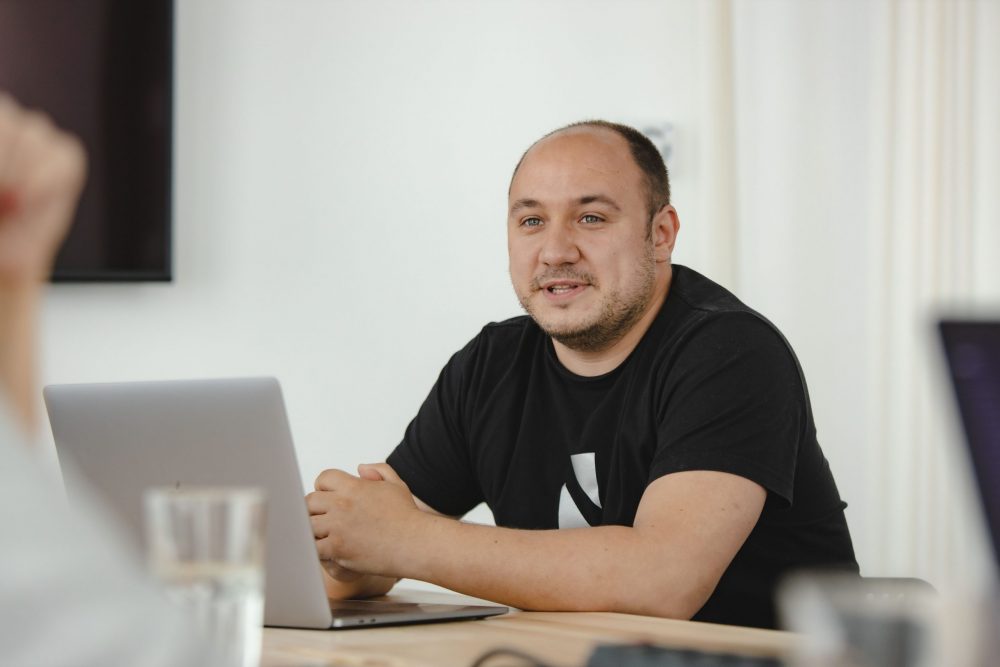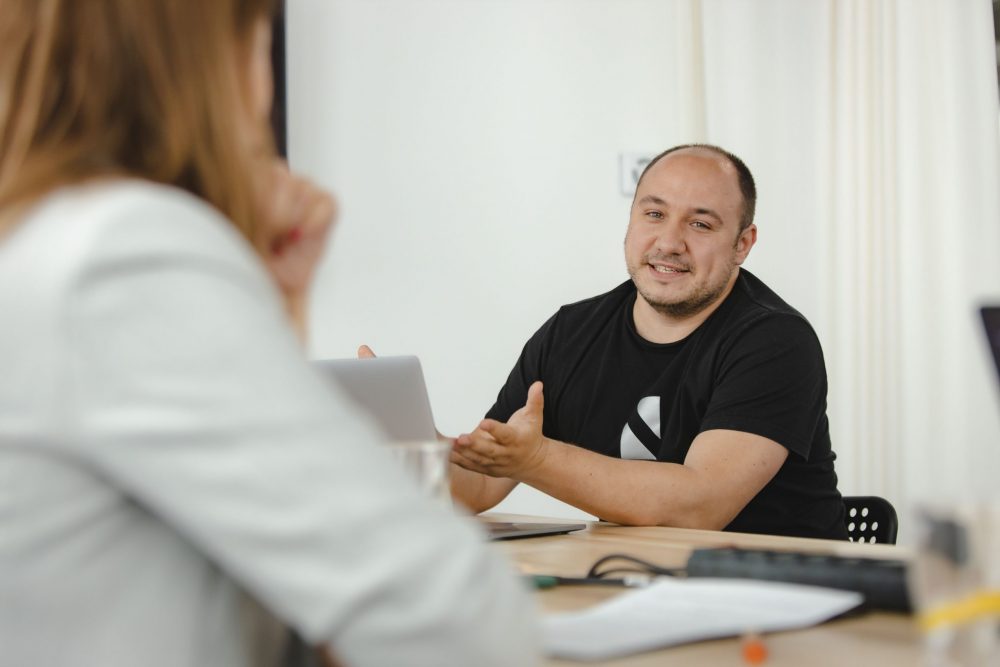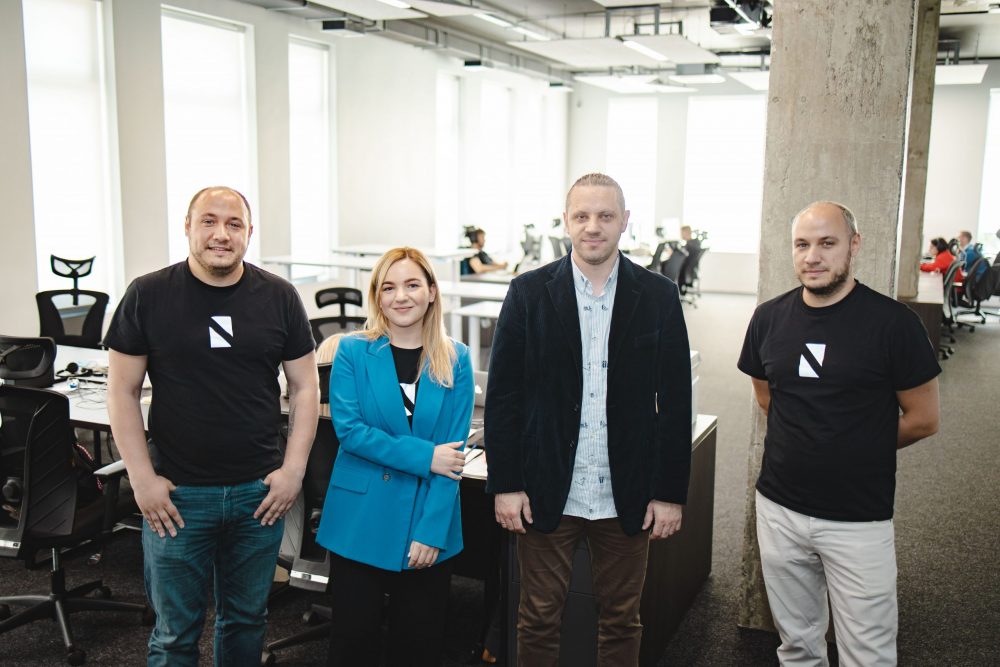Lots of Ukrainian IT companies are trying to embrace as many technologies as possible. Noltic, an IT consulting and software development agency, took another road. This niche company is specialized exclusively in Salesforce. Noltic builds not only projects commissioned by clients but also the Salesforce developers community in Ukraine. For this purpose, the company delegates its leading architects to meet with students. They also designed a free training course. One of the Noltic co-founders is Ihor Petrovych, a graduate of the MSc in Technology Management program run by the Business School of the Ukrainian Catholic University (LvBS).
With only four years in the IT market, Noltic has 40+ contracts, two products of its own, 50 experts on its team, two offices, and one blockchain startup. In the conversation with Ihor Petrovych, we discussed how to overcome the IT talent shortage, why companies should closely cooperate with students, and what UCU’s principles Noltic embraced when creating its training course.

– Ihor, why did you choose such a narrow niche as Salesforce? It is not typical for the Ukrainian IT market, where most companies try to cover as many technologies as possible.
Things just came together. In 2017, my brother Vladyslav went to London to work for one of the top IT companies. He gained hands-on experience with Salesforce, the world’s leading vendor of CRM platforms. Back in Ukraine, Vladyslav was so inspired talking about his experience that he got us all fired to set up our own company specializing in Salesforce. At that point, the three of us—Vladyslav Petrovych, Mykhailo Maryniak, and I—have already been toying with that idea.
What’s more, there was a huge market demand for Salesforce at the time, while only a few companies in Ukraine were familiar with this platform. So, we found our niche quite quickly.
By the way, it was my studies at LvBS that pushed me to set up a business. Today, Noltic has seven UCU alumni on board—graduates of the business school and the classical university. Another two students of applied sciences are halfway through their six-month internship.
– They say it is not easy to get hired by your company. What makes it so hard? The competition for talent is fierce. Everyone’s on the hunt for professionals.
Our company does have a rigorous hiring process. It is quality, not quantity, that matters. That’s why we have hired only 55 people in the past four years, not hundreds. The candidate’s soft skills are as essential as their expertise. We can decline a strong, senior-level candidate if their values are not aligned with ours. The candidates who get job offers from other headhunters often fail in our interviews.
But once someone joins our team, we do our best to create a motivating work environment and retain them for the long term. Our company has a culture of freedom and almost a horizontal structure. Why would you make anyone sit at the office and track every minute of working time if they perform well?
– How do you deal with the IT talent shortage with such a rigorous selection process? Or do you perhaps train people for your specific needs?
One of our tools is the Noltic Learning Center, set up in 2021. It helps build the Salesforce community in Ukraine and train new developers. The Noltic Learning Center offers a training course, technical meetups, and internship programs.
– Please tell us more about the training course. Who developed it, and what is its target audience?
It is a Salesforce training course designed by our architects. They developed a curriculum from scratch, zeroing in on the skills they needed to build up their Salesforce expertise early in their career. For the first pilot course, only 11 students from a group of 50 applicants were selected. We did not chase numbers, and it helped us maintain a personalized approach to every student and polish our program. The course took place from July to September.
– Were all the students juniors?
No. All kinds of people signed up, from first- and second-year students of computer science to senior developers from other companies eager to study Salesforce. The candidates were selected based on their logical reasoning and motivation.
In the end, two students got job offers from our company. Another one was offered an individual development plan guiding them on what they should do to join our team.

– Don’t you think that you might have spent too much time and effort to bring only two people on board? Can a company benefit from that?
Our goal is not just pragmatic—finding professionals and training them for our needs. The Noltic Learning Center is our contribution to the industry. The training is completely free, and it is our company’s investment for the long run. Designing high-quality learning products for our niche is crucial. We work out all our experts’ presentations in detail, be it out-of-office meetups or in-house course lectures. As a result, we create a quality product for the talent market.
I must add that our architects are eager to teach others. They have been working with Salesforce for years, and they are willing to share their know-how with the future generation of developers. Designing the curriculum and teaching students, they systematize their knowledge, too.
Our course is not massive, though. It is not our goal to teach anyone and everyone. That’s why we select only the most fitting and motivated candidates. Later, we invite the best of the best to join our team, opening the door to the talent market for the rest. This is our way of doing business—building up expertise and contributing to the community.
– Are you planning to continue the training program?
Yes, we are. We looked back at our first course and improved the curriculum, building on our new experience and the feedback provided by our mentors and students. The second call was already launched. If the first course was held fully offline in Lviv, then the second one is hybrid, both offline and online. As the applications poured in from across Ukraine and even Poland, we decided to accept more students and modify the training format. From the group of 90 applicants, 33 were selected. The course is underway, finishing in January.
Frankly, the quality of the applications took us by surprise. All the applicants had strong mathematical skills and were ready for the challenging journey.
– Has your experience of studying at UCU had any impact on this course?
Definitely. When developing the training program for the Noltic Learning Center, we often reflect on our experiences at UCU. In addition to Salesforce architects, three top managers with a UCU background are engaged in course design. These are Tereza Dychka, Head of Marketing, an alumna of the media communications program, Dmytro Babchuk, VP of Delivery, a data science grad student, and I.
Setting up the Noltic Learning Center, we analyzed UCU’s experience—how they motivate students to study, attend classes, and avoid cheating in exams. Like UCU, we are committed to academic integrity. Another of our commitments is a great learning atmosphere. The UCU leaders often say that “even your walls should inspire you,” and we agree with that. To this end, we refurbished our former office as a training center, having bought comfortable furniture and state-of-the-art classroom equipment. Now it’s equipped with a good projector and high-quality sound and video tech.
Our team also created a student guide describing our values. For example, it is important for us that students should not cheat, as they study for the sake of hands-on knowledge, not some certificate or score. The entry test that all candidates must take has been designed in a way that shows who simply copied formulas and who derived them by themselves. I check all the tests personally and filter out the cheaters. It makes more sense to enroll a candidate who did the test on their own, even if not completely error-free. Candidates like this become curious, motivated students driven to study, work, and share our values.

– Has your own life changed after the LvBS?
It has. First of all, I honed structured thinking and understood how business works. During my studies, I built a network of personal and business contacts. I still keep in touch with my classmates.
I appreciate UCU’s approach based on the principles of fairness and responsibility. I felt that most people enrolled in LvBS shared those values. We are building Noltic on the same foundation.
– How does this look like in practice?
Well, for example, we joined the 1% Pledge movement for corporate philanthropy. The partners of this initiative donate 1% of their income to charitable and social programs.
Communities are usually built by market giants, as they have enough resources and time for that. Our company is comparatively small, but we are ready to invest in market growth. In 2021, we organized 23 offline events at the universities, talking to the students of technical programs about Salesforce and the related career opportunities. We delegate our experienced architects to meet with students and inspire them for growth.
This year, I also created my own named scholarship for the student who scored 200 points nearly in all subjects of the external independent evaluation. It covers full tuition for one academic year at UCU’s Applied Sciences program.
I am convinced that by helping young people grow and study, we will help the country as a whole. UCU sets the bar high when it comes to learning standards, and it promotes the values that I was happy to share. It deserves our support.
– Do you have any other initiatives geared toward students?
Noltic has recently hosted another Students Day. A few times a year, we invite a group of students over to show them our company from the inside. The idea is not just to show them around the office but also to offer full immersion into our company’s life.
Students are asked to fill in the application form, and then we choose ten of them, those most motivated. They spend the whole day at our office: we explain how IT business and our agency work, give corporate gifts, and share some useful tips about informal learning activities to facilitate their careers: books to read, courses to take, subjects to explore for personal growth, movies to watch and get inspired. The company co-founders meet the students and share their business stories. The visitors can talk to any team member and ask them questions.
This is our way of showing the new generation how the IT industry works and inspiring them to follow this road.
– And the last question. How did your company survive the two years of the pandemic? Did you have to adapt or change anything?
At UCU’s Business School, they told us how important it was to build a stress-resistant company. We based Noltic on this principle. So, it’s no wonder that during COVID-19, we not only avoided the crisis but signed two new projects. Over the course of the pandemic, we invested in a startup, rolled out two Salesforce-based products, started to search for a new office, and our team grew by 30%.
Flexible schedule and remote work were in place long before the first lockdown, so nothing changed much after the pandemic broke out. The office was open to those who found it more comfortable to work outside the home. Still, when summing up 2020, we were surprised at how effective that year turned out to be, no matter what, and how much our team bonded.





















